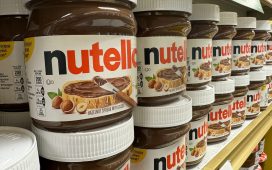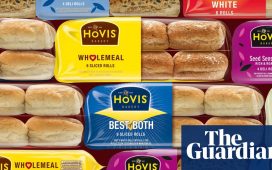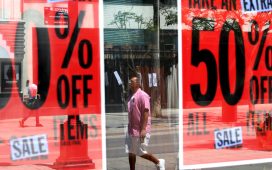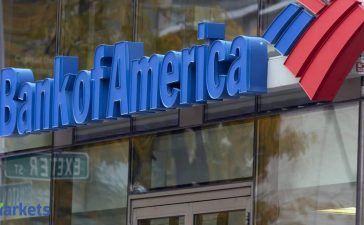Retailers in Great Britain suffered a slump in sales in October as the impact of high borrowing costs and rising prices signalled a high street recession in the run-up to Christmas.
Bad weather also played a part in a 2.7% year-on-year fall in retail sales that the Office for National Statistics (ONS) said hit clothing and household goods stores the hardest.
Emphasising the severity of the downturn, the ONS said the month-on-month drop in October was 0.3%, much lower than the 0.3% rise economists polled by Reuters had forecast. Figures for September were revised down to show sales dropped by 1.1% on the month, a sharper fall than the 0.9% first estimated.
Retail sales volumes in October were at their lowest level since February 2021, during the Covid-19 pandemic, when there were “widespread and extensive restrictions to non-essential retail in England, Scotland and Wales”, the ONS said.
Several shop chains have warned of a difficult year ahead, with the luxury clothing retailer Burberry being the latest.
The retail analyst Nick Bubb said there was plenty of evidence of retailers struggling to attract customers for much of the year, adding that the evidence from the US, where interest rates have also climbed steeply, was similar.
The ONS said the soaring price of petrol and diesel was another factor deterring shoppers. A fall in car use meant consumers were less likely to visit out-of-town shopping centres or nearby towns to buy high-priced items.
Food retailers reported a 7.7% increase in spending on a year ago and online retail sales were up by 6.1%, but volumes were down in both cases as inflation resulted in consumers paying more for less.
The retail sales report also showed that shoppers are shunning specialist food stores in favour of supermarkets, in the cost of living squeeze.
Supermarkets reported an increase in sales volumes of 0.2% in October, while specialist food stores such as butchers and bakers reported that sales volumes fell by 4.2%.
Alcohol and tobacco stores were hit by a 10.4% drop in sales volumes.
Feedback from these retailers suggested that consumers were buying cheaper products and prioritising important items, the ONS said.
Danni Hewson, the head of financial analysis at AJ Bell, said this is because middle-income households are being squeezed by rising mortgage costs.
“What is particularly interesting is the food sector. Even here spending is down but it’s where that spend has fallen which alludes to the impact rising mortgage costs are having on middle-income families.
“Supermarkets which offer value brands and own-label deals maintained a bit of growth but speciality stores like butchers and artisan bakers saw trade drop off.
after newsletter promotion
“Little luxuries are an affordable ray of sunshine but everyday sustenance is another thing entirely and it’s hard to justify an ancient grain loaf when a couple of slices from a prepackaged one does the job at a fraction of the price,” she said.
The “lipstick effect”, a term coined to illustrate the demand for small indulgences during a squeeze on incomes, meant cosmetics and toiletries had another strong month, said the British Retail Consortium.
More expensive purchases, such as laptops and electrical appliances, were being shunned as shoppers waited to pick up Black Friday bargains, it added.
Helen Dickinson, the chief executive of the BRC, said consumer confidence was weakening because of higher mortgage and rental costs.
Martin Beck, the chief economic adviser to the EY Item Club, said: “The retail sector is unlikely to experience a significant uptick in fortunes in the near term. The impact of higher interest rates is building, with an extra 1.5 million households with mortgages set to see fixed-rate deals expire and roll on to higher rates before the end of 2024.”
However, like many economists, he said higher wage rises and falling inflation would soon increase household disposable incomes.
“Retailers aren’t out of supports. In the short-term, October’s drag from weaker fuel sales may reverse as recent falls in oil prices feed through to lower pump prices.
“Meanwhile, falling inflation, combined with still-strong pay growth, means momentum in real earnings is building. And the jobs market appears to be proving resilient despite a sluggish economy, with unemployment remaining at a low level in the latest data and job vacancies still above pre-Covid levels,” he added.









